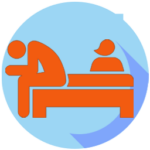Imagine the sudden and overwhelming urge to sleep, striking at any moment, without warning. For individuals with narcolepsy, this scenario is a daily reality. Narcolepsy is a neurological disorder that disrupts the normal sleep-wake cycle, resulting in excessive daytime sleepiness and a range of other symptoms. In this blog, we’ll explore the fascinating yet often misunderstood world of narcolepsy, shedding light on its causes, symptoms, diagnosis, and available treatments.
Understanding Narcolepsy
Narcolepsy is a chronic neurological disorder characterized by a profound disruption in the regulation of sleep-wake cycles. While it is relatively rare, affecting approximately 1 in 2,000 people, its impact on the lives of those who experience it is profound.
Key Characteristics of Narcolepsy:
- Excessive Daytime Sleepiness (EDS): This is the hallmark symptom of narcolepsy. Individuals with narcolepsy experience overwhelming and irresistible urges to sleep during the day, often at inappropriate times. These “sleep attacks” can last for just a few minutes or extend for more extended periods.
- Cataplexy: Narcolepsy is often accompanied by a unique symptom called cataplexy. Cataplexy is a sudden loss of muscle tone, usually triggered by strong emotions like laughter, excitement, or anger. It can range from mild muscle weakness to complete paralysis and can be particularly debilitating.
- Sleep Paralysis: During sleep paralysis, individuals temporarily find themselves unable to move or speak while falling asleep or waking up. This can be a frightening experience and is often accompanied by vivid hallucinations.
- Hypnagogic and Hypnopompic Hallucinations: These are vivid and sometimes terrifying hallucinations that occur when falling asleep (hypnagogic) or waking up (hypnopompic). They are a result of the brain transitioning between wakefulness and sleep.
- Fragmented Nighttime Sleep: Individuals with narcolepsy often have difficulty maintaining continuous and restorative nighttime sleep. This contributes to their excessive daytime sleepiness.
Causes and Diagnosis
The exact cause of narcolepsy remains the subject of ongoing research, but it is believed to involve a combination of genetic, environmental, and autoimmune factors. In some cases, narcolepsy has been linked to a deficiency of a neurotransmitter called hypocretin (also known as orexin), which plays a crucial role in regulating wakefulness.
Diagnosing narcolepsy typically involves a comprehensive evaluation by a sleep specialist. This evaluation may include a detailed medical history, a sleep diary, overnight polysomnography (a sleep study), and a multiple sleep latency test (MSLT) to assess daytime sleepiness.
Treatment Options
While narcolepsy is a chronic condition that has no cure, several treatment options can help manage its symptoms and improve the quality of life for individuals affected by it:
- Medications: Stimulants, such as modafinil or methylphenidate, are commonly prescribed to combat daytime sleepiness. Medications like sodium oxybate (Xyrem) may be used to improve nighttime sleep quality and reduce cataplexy.
- Lifestyle Modifications: Adopting good sleep hygiene practices, maintaining a regular sleep schedule, and incorporating short naps into the daily routine can help manage symptoms.
- Therapy: Behavioral therapy, including cognitive-behavioral therapy (CBT), can be beneficial in managing narcolepsy-related symptoms and improving sleep quality.
- Support: Support groups and counseling can help individuals with narcolepsy cope with the emotional and social challenges that often accompany the disorder.
Conclusion
Narcolepsy is a complex and often misunderstood condition that can significantly impact a person’s life. While there is no cure, early diagnosis and appropriate treatment can help individuals with narcolepsy manage their symptoms effectively and lead fulfilling lives. Increased awareness and understanding of narcolepsy within the medical community and society at large are essential to provide the necessary support and accommodations for those affected by this condition. By shedding light on this often hidden disorder, we can work towards a more inclusive and compassionate society for all individuals, regardless of their neurological differences.
If you suffer from Narcolepsy, we advise taking Generic Modvigil












